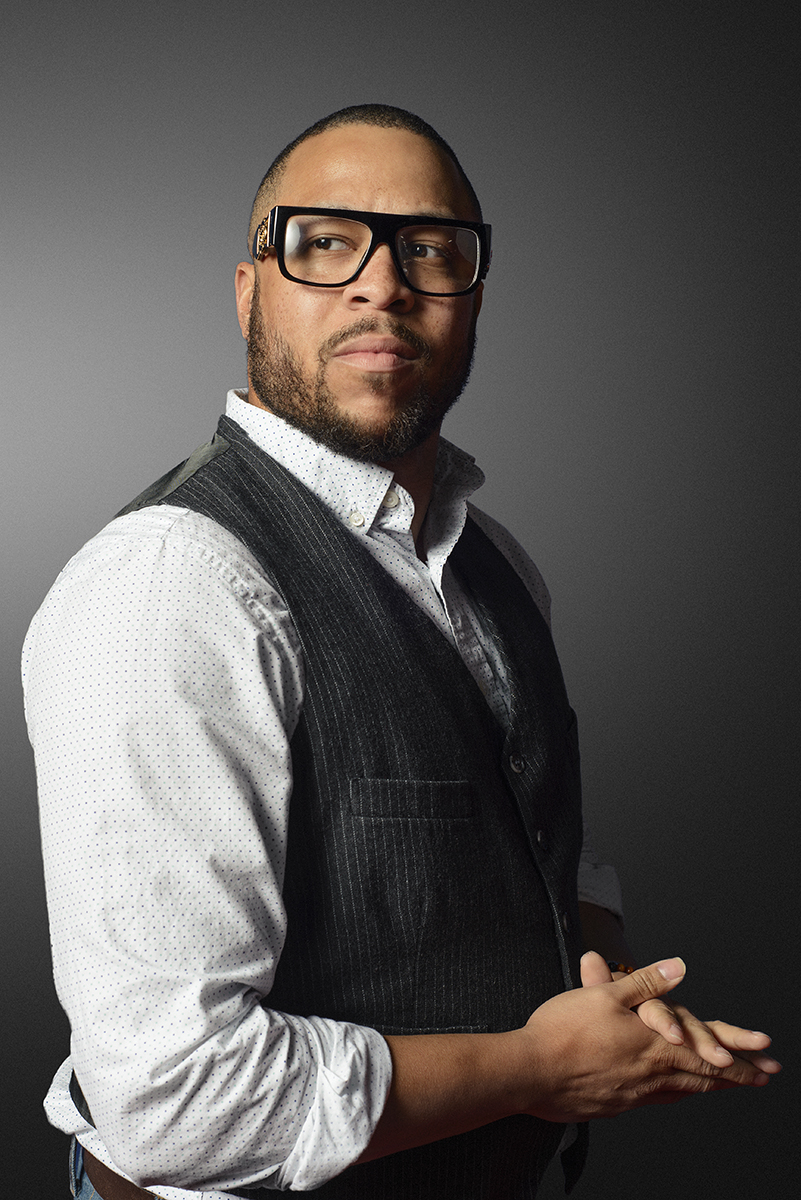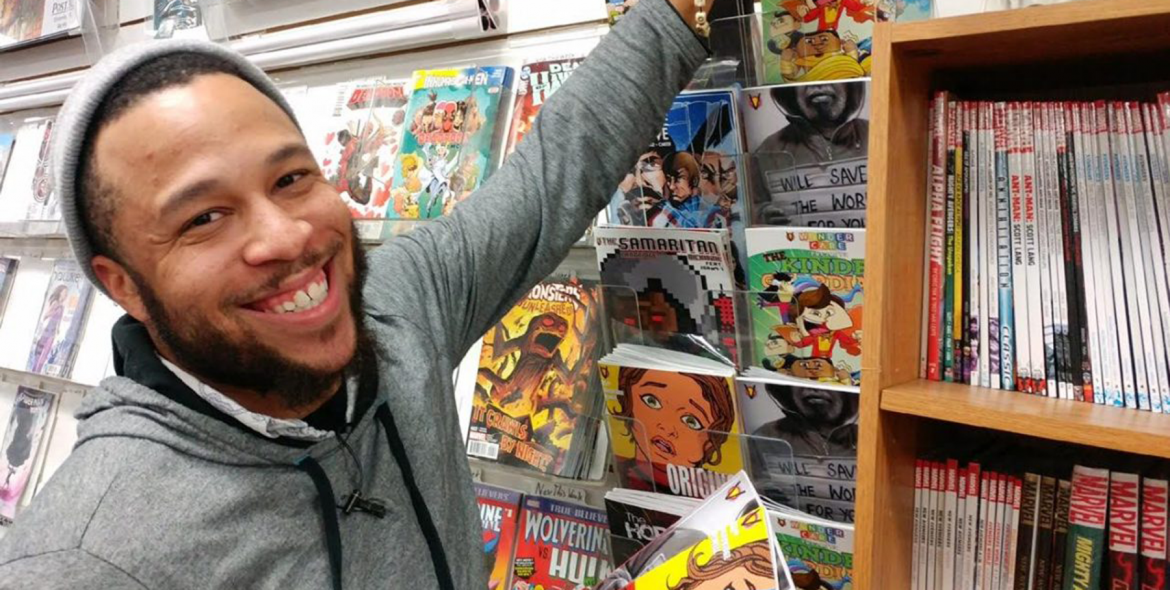Victor Dandridge is a writer and publisher of comics based in Columbus, Ohio. He founded the imprint Vantage: Inhouse Productions and has been running it for over ten years. As a kid, Dandridge fell in love with comics. As an adult, he decided to leave his job and delve into comics full time. Dandridge dabbles in many corners of comics and media and here at PATTERN, we love connecting with and sharing work of Midwest-based creators. Dandridge is the hardest working man in comics, and we get to learn about why. In our conversation, we talk about the good and the bad of familial confidence and doubt, his myriad responsibilities running an imprint and why comics and the art of story are so wonderful.
What is your role as the creator of Vantage: Inhouse Productions?
In the industry there are different job positions when it comes to making comics. There’s the writer, the penciler, the inker. When it comes to self-publishing you end up wearing multiple hats. That’s what I do. When it comes to the physical production of a book, I am the writer, the letterer, the publisher, the display designer. Those are all things that I have to do in my day-to-day. One of the things that’s really fun is that I get to make up what I need to do every day. Every day is a brand new challenge creatively of what my goals are. I list everything by creating more, get people to talk about what I have created, and then build networking opportunities. Those are the three things that I aim to do every day, in some way, shape or form. I’m trying to create new opportunities every day.

It seems like you do a lot. Do you have a small staff or is it all you?
It’s all me. The only thing that’s not me are the artists. I commission people to do the illustrations for the books that I do, because I don’t like to draw. I can draw, but I don’t love it. Quality is such an important factor in terms of creating great stories and having them resonate with people. Because I don’t love it, I will hire people that have a great style that do love it. We can collaborate and create better works together. When it comes to anything else, it’s all me.
Do you have a specific drawing style that you look for?
It depends on the story. If I am doing something that’s more traditional superhero oriented I do look for that style. One of my most prolific and popular titles right now is called Wondercare Presents: The Kinderguardians. It’s very kid-friendly and cartoonish. My co-creator Justin Castaneda does that very well. For him to make it more traditional wouldn’t really work as well, because that’s not the vibe of the story. Story is everything from me. It’s really about how you create that entrance point for your readers. Everything has to flow together. If there’s something out of sync, I think people will know.
Can you tell us about your partnership with Aha Media?
I’m new to working with them on this scale. My expectations are what I can speak to, and I definitely think they are equipped to meet them. They don’t just give me money. Unless I’m producing content specifically for Aha to use, which is something totally different. In terms of the deal that we’ve got, what they are for is to help me develop my concepts to make them Hollywood ready. Through their experience and their contacts they are setting up opportunities, setting up pitch meetings, and making suggestions to the things that I’m doing. I think that’s the most distinct way to understand what that agreement is. It’s a really smart partnership on my part. I still get to create in the medium that I know. My expertise is in comics. They don’t get my comics, they don’t get my IP. They get the right to say, “We’re ready to take this particular IP to the next level. These are the things we want you to do to help us sell it once we have it ready to go.” That’s what the framework of our partnership and collaboration is. I’m creating things on this base level. They’re looking at what I created and saying, “This could be an amazing animated project, TV series, or movie within the next 3-5 years. So, this is what we want you to do to get it ready for us to take it to a studio or a production company.” They don’t have a say in me wanting to make a comic. One of the things I love about Aha is they are very creator focused. They are giving more ability to creators.
You say you didn’t like to read as a kid until finding comics, and now you’re a writer. Is there anything else you like to read now besides comics?
I prefer comics. I’m not going to lie. It’s not that I’m not open to it. I definitely am. The subject matter has to interest me. I talk a lot, and ironically I hate reading a lot of words. If it’s too many words that I am uninterested in I tune out. That becomes a problem, because obviously if I’m trying to get into characters and things like that I’ll miss something. I have found that audiobooks work better for me when it comes to non-visual stimulating imagery. I listened to Jurassic Park. It totally blew my mind. It ran about 12 hours but it was perfect for moving around, driving, cleaning, whatever. Comics are my first love, and it’s really because of the style of stories that they tell. I love the visual challenge of deciphering information and just reading words is not as fun. That’s why I don’t love it as much. One of the reasons why I love comics so much is because we’re supposed to outgrow the concept of picture books. Comics actually mature and marry them in a way that is sophisticated. You have to understand how we read as a Western culture; the whole left to right, top to bottom structure, to understand how the panels are even to be read. There’s a cultural thing to it that’s really interesting and challenging if you pay attention to the way that it works. Some people look at comics and say, “Oh that’s just for kids.” There’s very complicated measures to reading comics, almost like reading music. It’s different.
How do you feel you’ve honored your “vow by candlelight to make something of yourself” to your Uncle Mark? What is your favorite thing you’ve done thus far?
My favorite thing is always what I’m going to end up doing tomorrow, because it’s an opportunity to do something big and new and different. I definitely think that my uncle would be proud of what I’ve done so far. I never want to lean into that though, because it’s almost grounds to quit. I think the biggest thing for me is to show to young people, kids that look like me, that you can find success in something that you love. It doesn’t matter what it is, as long as you are dedicated to it. That’s something that on a cultural level I think is important to share. It’s a weird tongue in cheek thing because representation for me is not necessarily a focal point. I like the idea of being represented in actions, not what you look like. That’s important because there are people that don’t look like me that I should absolutely look up to, that I should speak about with prominence, and showcase why they are successful and important. Too many times when you get into the facets of what somebody looks like or demographic checkmarks you can overlook people that you can very well learn from. I think we can learn a lot from all kinds of things. At the same time I do recognize my sense of responsibility. A Black creator is what I am, not necessarily who I am. There’s going to be people that see me and say, “I can do this because he does it.” I’d be crazy not to acknowledge that. That’s the thing that my uncle would be most proud of. While I am striving to be a universal creator, I do recognize and have actively aimed for people that look like me to find and feel comfort in this medium that I found safety, success, and comfort in.
You seem very close to your family. How do they support you?
My mother is a musician. While that’s not been her main occupation, it’s something she’s done forever. She was definitely into supporting my move into the arts. She was like, “That’s your voice, use it.” On my father’s side they were more practically minded people in general. You get up, you go to work, this is what you do. I often say my dad was very against me leaving a cushy state job in order to make comics. He was like, “That’s crazy. People don’t do that.” I was like, “You’re absolutely right, they don’t do that. That’s why I’m doing it.” Having achieved a level of success, he immediately was like, “Okay you’re right.” That was something really important. It is something that I have explained to my children. There are going to be things that they want to do in life and despite what it seems like I should agree with I’m going to tell them no, because practicality matters. To a degree, I’ll call it a test. If I tell them no, and they back off then they really didn’t want this. If I tell them no and they say, “You know what dad, I’m doubling down and I’m doing this thing.” No matter what threat I give them, if they say they are still going to do it then I know it is their soul. This is what they want, and I’m going to quietly celebrate them as loudly as I possibly can until they have achieved something that says, “I’m right. I have proven that this is what I want to do and I will be as raucous as I possibly can.” It’s not just this pat you on the back thing. My dad thought I couldn’t do it, until I did it. That was important, because doubt goes a long way in motivation. Some people that are just told yes without any opposition never really tap their fullest potential. They’re just coasting. You need struggle in order to grow. I appreciated that bit of struggle from my parent to motivate me.



